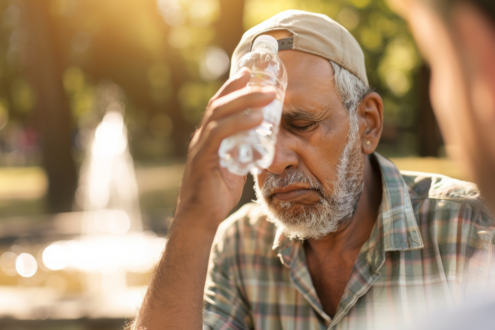
As we swelter in the latest stretch of heat, it’s not hard to believe that the summer of 2024 was the hottest ever recorded on Earth. At least 1,006 Americans succumbed to heat during heat waves, which began in March and lasted until September. With local temperatures already spiking into the 90s, being able to recognize the early warning signs of heat-related illness is more important than ever.
Heat-related illnesses happen when your body can’t cool itself properly. Normally, sweating helps regulate your temperature. But when it’s extremely hot or humid, your body may struggle to keep up. This is especially true if you're dehydrated, overexerting yourself, or in direct sunlight for too long.
Early warning signs of heat-related illness include:
Tips for Beating the Heat
Because preventing heat-related illness is a far better option than treating it, here are some tips for staying safe and cool in hot weather:
Stay Hydrated: Drink plenty of fluids, especially water. Avoid alcohol and caffeine, which can dehydrate you.
Dress for the Heat: Light-colored, loose-fitting clothes help your body stay cool. Don't forget a wide-brimmed hat and sunglasses for added protection.
Use Sunscreen: Sunburn affects your body's ability to cool down, so apply a broad-spectrum sunscreen with at least SPF 30.
Avoid Peak Sun Hours: If possible, limit outdoor activities to early morning or evening when it's cooler.
Take Breaks: If you're engaging in physical activity, take frequent breaks in a shaded or air-conditioned area.
Know Your Limits: Listen to your body. If you feel overheated, stop what you're doing and find a cool place.
Check on others: especially elderly neighbors or family members who may be vulnerable.
NOTE: If you have any chronic health conditions or are taking medications, consult your doctor about additional precautions you should take in hot weather.
Heat Cramps
Symptoms:
- Painful muscle cramps or spasms (usually in legs or abdomen)
- Heavy sweating
What to Do:
- Stop all activity and rest in a cool place
- Drink water or an electrolyte drink
- Stretch gently or massage cramped muscles
Heat Exhaustion
Symptoms:
- Heavy sweating
- Weakness or fatigue
- Dizziness or fainting
- Nausea or vomiting
- Headache
- Cool, pale, or clammy skin
- Fast, weak pulse
What to Do:
- Move to a cooler, shaded area or indoors
- Loosen clothing and apply cool, wet cloths
- Sip water slowly
- Rest and monitor symptoms
If symptoms worsen or don’t improve within 30 minutes, seek medical help.
Heat Stroke
The most serious—and life-threatening—heat-related illness heat stroke can develop quickly, so it's important to know the symptoms and be on the lookout for them.
Symptoms:
- A core body temperature of 103°F or higher
- Confusion, agitation, or altered mental state
- Hot, red, and dry or damp skin
- Fast, strong pulse
- Rapid breathing and heart rate
- Throbbing headache
- Nausea and vomiting
- Muscle weakness or cramps
- Dizziness, light-headedness
- In severe cases, heat stroke can lead to seizures, loss of consciousness, or even coma
What to Do:
- Call 911 immediately
- Move the person to a cooler place
- Cool their body using whatever means available:
- Immerse them in cold water if possible (most effective method)
- Apply cold, wet towels to the body
- Use fans while misting with cool water
- Place ice packs on the head, neck, armpits, and groin
- Do not give fluids if the person is unconscious or confused
Heat-related illnesses can come on quickly and escalate fast, but they’re also highly preventable. Pay attention to how you’re feeling, look out for warning signs in others, and take action early. Remember, it’s not just about being comfortable. It’s about staying safe and healthy.
Sean Burns, MD, is the EMS Medical Director/District 12 Medical Advisor at Southwestern Vermont Medical Center.